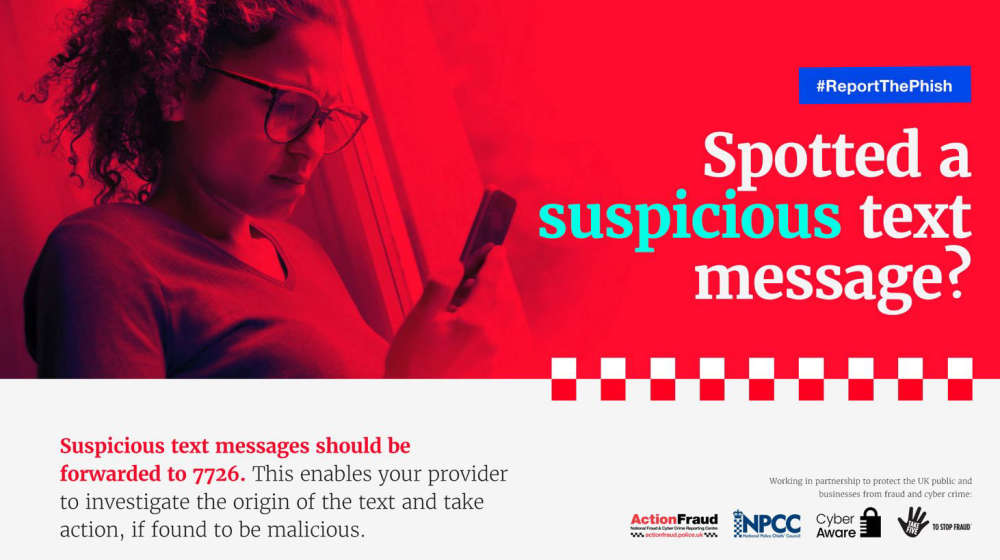
Officers at Northamptonshire Police are supporting a new national campaign aimed at raising awareness of phishing scams in a bid to stop residents across the county from being defrauded.
Today (Monday, July 11), colleagues from the City of London Police are urging the public to remain vigilant when it comes to suspicious text messages or emails from those impersonating well-known organisations or pretending to be a loved one.
Latest figures show that as of May 31, this year, the public has made more than 12 million reports to the Suspicious Email Reporting Service (SERS), with the removal of over 83,000 scams and 153,000 malicious websites.
SERS was launched by the National Cyber Security Centre (NCSC) and the City of London Police in April 2020 to enable the public to forward suspicious emails to an automated system that scans them for malicious links.
The most impersonated organisations in phishing emails reported last year were the NHS, HMRC and other gov.uk departments associated with the ongoing Covid-19 pandemic.
Whilst in Northamptonshire, about 30 per cent of reported frauds are committed through a telephone, and victims in the county lost approximately £6 million last year to such scams.
This has prompted officers from the Force’s Economic Crime Unit to get behind a new City of London Police campaign to share the tactics which are more commonly being used by fraudsters.
Fraud Protect Officer PC Neil MacKenzie of the Force’s Economic Crime Unit said: “Nearly everyone has a mobile phone which can receive text messages, voice calls or emails.
“Fraudsters can, and do, send thousands of messages each day to both individuals and businesses, and they only have to catch a few in their phishing net to make it worth their while.
“We’re working hard to prevent people from being victims of frauds and scams and we would urge everyone to be vigilant of unexpected messages or calls which ask for personal or financial information, or request money.
“If you receive a call or message which you think might be a scam, don’t respond to it. Instead, contact the organisation directly using other means such as contact information from the company’s official website. Never click on the link provided in the message itself.
“Another popular scam is a text or WhatsApp message from a loved one, who claim to have lost access to banking apps due to a new mobile phone and ask for help to pay an urgent bill.
“In any fraud attempt the criminals will try to create trust, hence using well known organisations who you may deal with ordinarily, then quickly paint a picture which requires urgent action to ensure the victim acts on their emotions rather than take time to reflect on what is happening they want you to act immediately
“We would urge everyone who is involved in a caring or supportive role to people of these ages to start conversations about the tactics used and warning signs to look out for telephone fraud.
“Just having that conversation, especially if their loved one is not particularly tech savvy, could be the difference on whether someone becomes a victim of this trust-eroding crime.”
What is phishing?
Phishing or smishing is when criminals use scam emails, text messages or phone calls to trick their victims. Whether it’s an email asking you to “verify” your bank account details, or a text message claiming you’ve been in close contact with someone that’s got Covid-19, the goal is usually the same - to trick you into revealing personal and financial information.
Protect yourself
Fake emails and texts can be difficult to spot as criminals are constantly getting better at creating genuine-looking messages.
Here’s some practical advice you can follow when it comes to dealing with phishing scams:
1. If you have any doubts about a message, contact the organisation directly.
Don’t use the numbers or address in the message – use the details from their official website. Remember, your bank (or any other official source) will never ask you to supply personal information via email.
2. If you think an email could be a scam, you can report it by forwarding the email to: report@phishing.gov.uk. Send us emails that feel suspicious, even if you're not certain they're a scam - we can check.
3. Most phone providers are part of a scheme that allows customers to report suspicious text messages for free by forwarding it to 7726. If you forward a text to 7726, your provider can investigate the origin of the text and arrange to block or ban the sender if it’s found to be malicious.
4. If you’ve lost money or provided personal information because of a phishing scam, notify your bank immediately and report it to Action Fraud at www.actionfraud.police.uk or by calling 0300 123 2040.
Mobile network providers also offer a service which allows customers to report suspicious text messages, by forwarding them to the number 7726. The service is free of charge and enables providers to takedown malicious websites and block malicious texts from being sent across their network.
Kelly Paterson, HMRC’s Chief Information and Security Officer, said: “Never let yourself be rushed. If someone contacts you saying they’re HMRC, wanting you to urgently transfer money or give personal information, be on your guard.
“Tax scams come in many forms. Some threaten immediate arrest, others offer a rebate. To help us fight these crimes, please forward suspicious texts claiming to be from HMRC to 60599 and emails to phisihing@hmrc.gov.uk – report tax scam phone calls to us on Gov.uk.”
If you think you have been a victim of fraud you should report it to Action Fraud, the UK’s national fraud reporting centre by calling 0300 123 20 40 or online by visiting www.actionfraud.police.uk.
It’s also important to report all fraud-related incidents to Action Fraud to help build a national picture and help prevent others falling victim to scams.


 Local news content from CItiblog - read more at
Local news content from CItiblog - read more at  True crime expert from Olney nominated for national awards
True crime expert from Olney nominated for national awards
 Why Modernising Contract Drafting and Review Processes Matters for Business Growth
Why Modernising Contract Drafting and Review Processes Matters for Business Growth
 Countdown is on to Northampton Dragonboat Festival 2024
Countdown is on to Northampton Dragonboat Festival 2024
 Help to identify Kingsthorpe Man known as 'Terrance'
Help to identify Kingsthorpe Man known as 'Terrance'
 Totectors celebrate awards success
Totectors celebrate awards success
 Charity Single is a big hit
Charity Single is a big hit
 Have Your Say On Measures To Promote Responsible Dog Ownership
Have Your Say On Measures To Promote Responsible Dog Ownership
 Northampton Market Relocation
Northampton Market Relocation


Comments
Add a comment